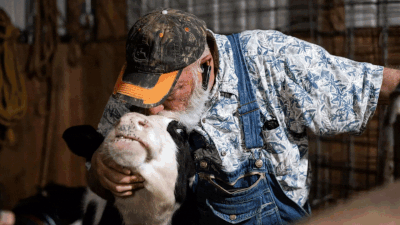- News
- World News
- US News
- Why cow cuddling, a social media rage, is under threat in US
Trending
Why cow cuddling, a social media rage, is under threat in US
In 2022, over 28,600 farms across the US engaged in agritourism, offering activities like goat yoga and sunflower picking, generating $1.26 billion—a 32% increase from five years earlier, according to USDA data. This income is crucial as US farm earnings are predicted to suffer the sharpest drop in 18 years due to declining crop prices, with smaller farms particularly affected.

Cow cuddle session at Luz Farms (Photo credit: Reuters)
NEW DELHI: In the serene pastures of rural America, a seemingly whimsical activity has gained popularity: cow cuddling. This unique form of agritourism, where visitors pay to spend time with cattle, offers more than just a novel experience; it has become a crucial economic activity for many small farmers. These interactions, often highlighted on social media, not only provide city dwellers with a taste of country life but also offer therapeutic benefits to participants.
"Agritourism has become a significant economic boon for small farmers who have carved out a niche for themselves," said Curt Covington, Senior Director of Institution Credit at AgAmerica Lending.
Cow cuddling
Farmer Luz Klotz straightened the brightly striped hair bow on Reba, a 1,600-pound heifer lounging on the ground under twinkling fairy lights. Teenager Joey Pachl, hoping to impress his girlfriend with an invitation to the high school prom, had paid $75 for an hour-long cow cuddling session at the farm.
However, the pastoral tranquility of such farms is currently under threat from an unexpected source—the outbreak of bird flu in dairy herds across several US states. The presence of H5N1, a highly pathogenic avian influenza virus, in dairy cattle poses significant risks not only to the livestock but also potentially to human health. This development has prompted urgent responses from both state and federal agricultural departments, urging farmers to limit public access to their farms to control the spread of the disease.
In Michigan, the state's agriculture department responded swiftly with an emergency order to implement new sanitation measures and limit public access to farms. "Now is not a good time to cuddle cows," said Tim Boring, the department's director, emphasizing the need to protect both animal and human health.
The restrictions, while necessary, pose significant economic risks to small family farms that depend on agritourism. For places like the De Vor Dairy Farm and Creamery in northern Michigan, where bookings are made weeks in advance, the financial implications are particularly severe. As the industry navigates these challenging times, the resilience of these small enterprises and the adaptability of agritourism will be critically tested.
(With inputs from agencies)
"Agritourism has become a significant economic boon for small farmers who have carved out a niche for themselves," said Curt Covington, Senior Director of Institution Credit at AgAmerica Lending.
Cow cuddling
Farmer Luz Klotz straightened the brightly striped hair bow on Reba, a 1,600-pound heifer lounging on the ground under twinkling fairy lights. Teenager Joey Pachl, hoping to impress his girlfriend with an invitation to the high school prom, had paid $75 for an hour-long cow cuddling session at the farm.
Pachl successfully wowed animal loving girlfriend Emma. For Luz and husband Dan Klotz, such visitors have become key to covering the feed bills and keeping their small farm running.
However, the pastoral tranquility of such farms is currently under threat from an unexpected source—the outbreak of bird flu in dairy herds across several US states. The presence of H5N1, a highly pathogenic avian influenza virus, in dairy cattle poses significant risks not only to the livestock but also potentially to human health. This development has prompted urgent responses from both state and federal agricultural departments, urging farmers to limit public access to their farms to control the spread of the disease.
In Michigan, the state's agriculture department responded swiftly with an emergency order to implement new sanitation measures and limit public access to farms. "Now is not a good time to cuddle cows," said Tim Boring, the department's director, emphasizing the need to protect both animal and human health.
The restrictions, while necessary, pose significant economic risks to small family farms that depend on agritourism. For places like the De Vor Dairy Farm and Creamery in northern Michigan, where bookings are made weeks in advance, the financial implications are particularly severe. As the industry navigates these challenging times, the resilience of these small enterprises and the adaptability of agritourism will be critically tested.
(With inputs from agencies)
End of Article
FOLLOW US ON SOCIAL MEDIA











